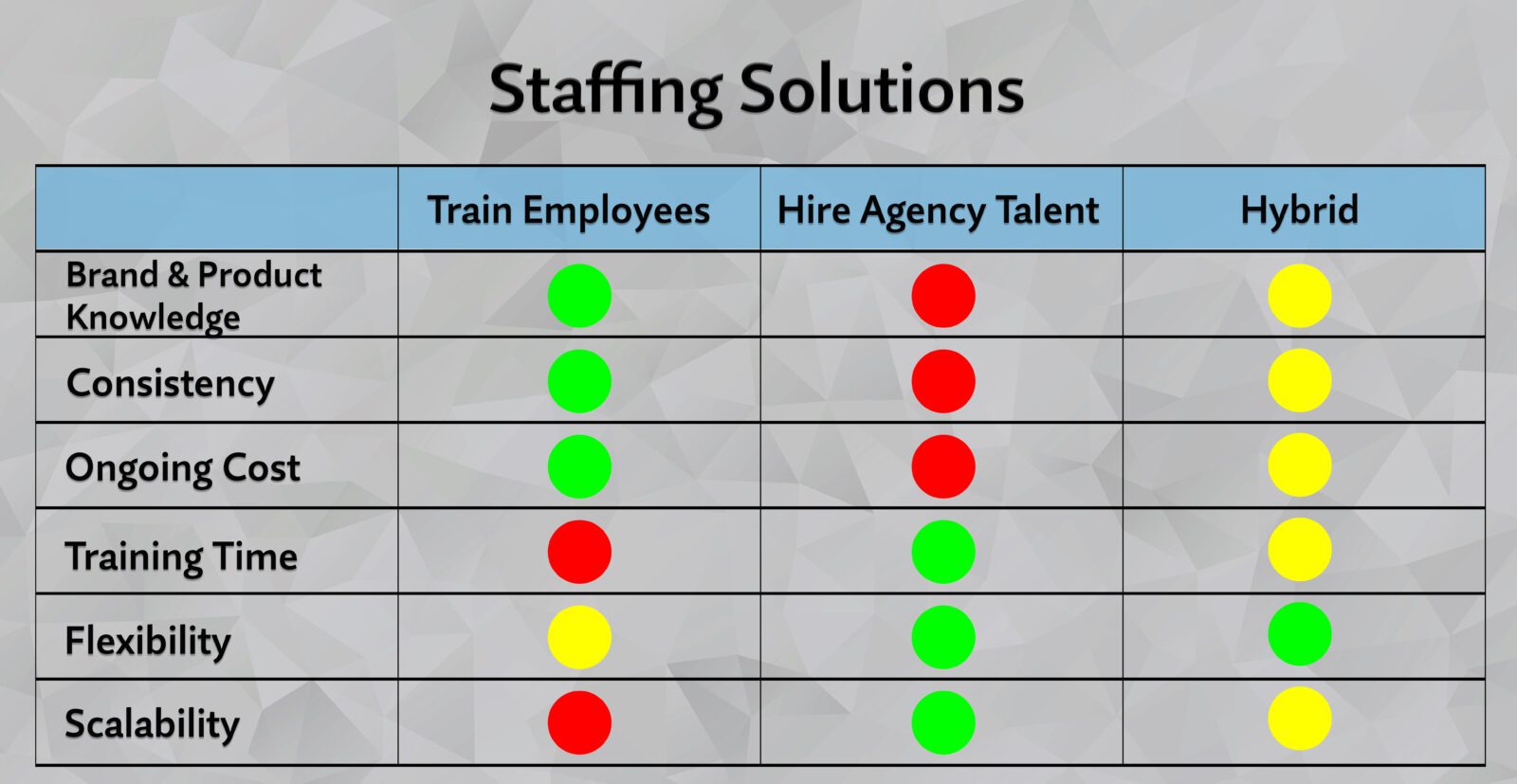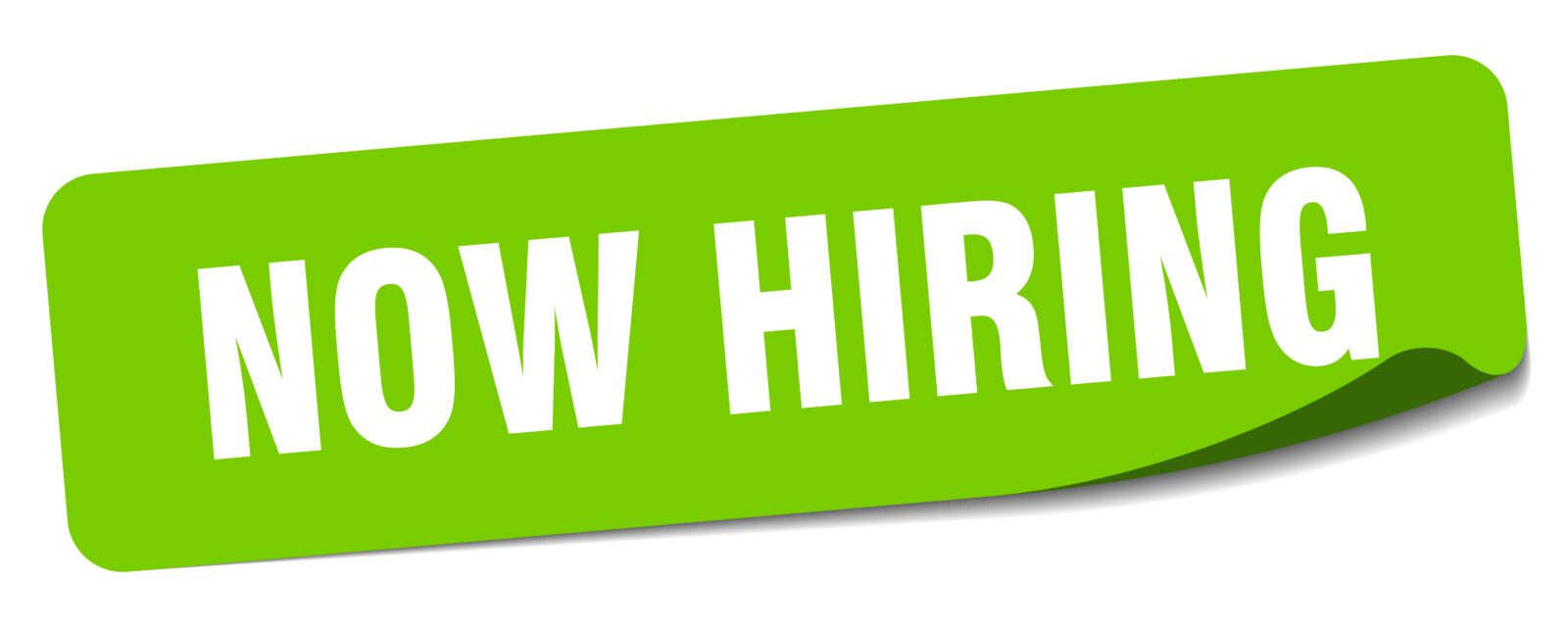
Picture this: The trade show floor is buzzing, your booth is gleaming, and the attendees are flocking. But who will be the face of your brand, turning curious visitors into loyal customers? In past editions, One Thing has explored the topics of training staffers and hiring outside agencies. Now, we’re bringing them together to see if we can figure out which way is best.
Should you train your own employees to master the art of engagement, hire seasoned pros who can charm in their sleep, or mix things up with a hybrid approach?
Let’s dive into the pros and cons of each option and find the perfect formula for your event marketing success.

What You'll Learn
- Training Your Own Employees: Pros & Cons
- Hiring Talent Agencies: Pros & Cons
- Hybrid Solution: Pros & Cons

Training Your Own Employees
Pros:
- Brand Knowledge: Your employees have a deep understanding of your products, services, and company culture. This can translate into more authentic and knowledgeable interactions with booth visitors. Think of them as your brand’s secret recipe – unique and irreplaceable.
- Consistency: Staff members who are part of your company can deliver a consistent message and maintain the integrity of your brand. No mixed signals here!
- Long-Term Investment: Training your own employees is an investment in your team’s skills and professional development, which can pay off in future events. It’s like teaching a person to fish – only without the smelly fish part.
Cons:
- Resource Intensive: Training requires time and resources, including workshops, role-playing sessions, and possibly bringing in external trainers. Get ready for boot camp!
- Opportunity Cost: Employees attending trade shows might be pulled away from their regular duties, which can impact day-to-day operations. Who’s minding the store?
- Experience Gap: Your team might lack specific skills in sales or customer engagement compared to professional exhibit staffers. Think of it as the difference between a home-cooked meal and a gourmet feast.
Learn more about how to prepare your team with our Booth Staff Bootcamp training blog.

Hiring Talent Agencies
Pros:
- Expertise: Professional exhibit staffers from talent agencies bring specialized skills in customer engagement, sales, and lead generation. They’re like the James Bonds of the trade show floor.
- Flexibility: You can scale your staffing needs up or down based on the size and scope of the event without impacting your regular workforce. It’s like having a staffing Swiss Army knife.
- Efficiency: Hiring from an agency can save time and resources that would otherwise be spent on training. Skip the boot camp, go straight to the action!
Cons:
- Brand Disconnect: External staff may not have the same level of knowledge or passion for your brand as your employees, which can affect the authenticity of interactions. It’s like hiring a stand-in for your favorite actor – they might look the part, but do they have the chops?
- Cost: Agency staff can be expensive, and costs can add up quickly, especially for larger events. Your budget might feel the squeeze.
- Reliability: There’s a risk that the temporary staff might not meet your expectations in terms of performance and professionalism. Think of it as a blind date: Sometimes you click, sometimes you don’t.
Explore more about hiring professional staffers in our Hiring Professional Staffers guide.

The Hybrid Approach
Pros:
- Best of Both Worlds: Combining the expertise of agency staff with the brand knowledge of your employees can create a well-rounded team. It’s like peanut butter meeting jelly – a classic combo.
- Balanced Workload: Your employees can handle high-level interactions and key conversations, while agency staff manage the flow of attendees and initial engagements. Think of it as the perfect dance partnership.
- Flexibility and Scalability: This approach allows you to adjust the mix based on the specific needs of each event. It’s like a choose-your-own-adventure book for staffing.
Cons:
- Coordination Complexity: Managing a hybrid team requires clear communication and coordination to ensure everyone is aligned and working towards the same goals. It’s like herding cats, but more rewarding.
- Training Time: Agency staff will still need some level of training to ensure they understand your brand and can represent it effectively. A crash course in brand love.
Moving Forward
Ultimately, the best approach depends on your company’s event marketing needs, resources, and goals. For some, investing in training their own employees might yield the best long-term benefits. For others, leveraging the expertise of professional exhibit staffers can offer immediate advantages. And for those looking to maximize flexibility and expertise, a hybrid approach might be the perfect solution. Whatever path you choose, remember that the key to a successful exhibit lies in a well-prepared, motivated, and knowledgeable team. Stay creative, stay focused, and most importantly, stay awesome!


